

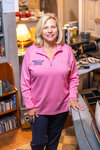
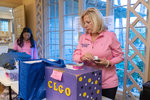
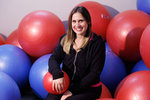
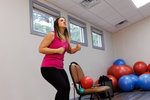
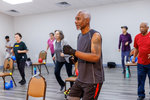
Is this the year you finally lose those 15 pounds, exercise regularly, and take a break from stress? How do you get started? How do you remain committed? How can it change your life?
The key to success is to celebrate the little successes and not dwell on failures or setbacks, says life coach Camy Kennedy, the owner of Powerhouse on Purpose in Fayetteville.
“Create a vision of success,” she adds.
Kennedy works with people she refers to as high achievers, perfectionists, and “people pleasers” — those who have goals based on the wishes of someone else.
“They have an all-or-nothing mindset. I want to teach them that a 1% shift over time will get you to your goal versus trying to go all in,” she says.
That tiny 1%, like starting your day a half hour earlier, has a compounding effect that will allow you to reach your goals sooner rather than later. She likens it to an airline pilot flying from New York to Los Angeles and altering his route by 1%, right or left, which could result in the plane landing in San Francisco or San Diego instead of Los Angeles.
“People will go all in for two weeks, and it’s not sustainable. Then they beat themselves up, go into a cycle of shame, and then they give up,” says Kennedy.
Kennedy describes her book, “It’s Happy Now,” as a handbook for high achievers.
Kennedy says her role in helping people lead happier lives addresses all aspects of life.
“I help them in everything in achieving their goal, not just health. It also includes money and in their processing of emotions,” she says.
Creating a “good” habit, Kennedy says, often takes at least six months to take hold.
Kennedy cautions that “enablers” may undermine your goal — enticing you to eat food not on your healthy diet or to take part in activities that may sabotage reaching your goal.
“You have to take ownership of your goal. It’s always fun to blame other people for not achieving your goals,” she says.
Kennedy says marketers created the timeline for making resolutions at the start of a new year. The best time to start a self-improvement program, she advises, is now.
“And you start with one small thing.”
Organization plan
Pam Warren is not just showing off when she advises her customers how to tidy up their home. She’s a pro at it through her company, Carolina, Let’s Get Organized.
Among her services are staging estate sales, for which she uses a textbook approach to organizing someone’s lifetime of accumulations.
“It’s a new year, so many of us are thinking about exercising, getting more rest, and organizing,” says Warren, adding that people can be “consumed” with achieving the resolutions they set for themselves.
“It is easier to keep in step with these resolutions if our homes are in order first,” she says.
Warren says helping her customers organize in January is rewarding because it helps them start the new year on a positive note.
“I encourage my customers to start with small projects to stay motivated for the whole year,” she says. “Getting started is always difficult.”
Warren suggests calling in a professional organizer from the “get-go.”
“I encourage my customers to do what I call a visual inventory of each space they want to organize.”
That can be done by simply sitting in a chair in the middle of a room and scanning wall by wall to decide what needs to be organized.
“You know that door that always stays closed because you just don’t know what to do? Let’s open it, walk in, put a chair at the doorway and evaluate,” she says.
Organizing can look different from person to person.
“It has to work for you in your mind, to maintain the space. It may take some tweaking to get your ideal situation. Once we are there, it’s like a home run.”
‘Move more, sit less’
Monika Cotter says the best way to stay committed to a workout regime is to find something you enjoy doing.
“Exercising consistently can be a challenge in itself,” says Cotter, the owner of Under Construction Fitness in Hope Mills. “Finding something you enjoy will help you to want to get it done and stay committed to yourself and your goals. Hiring a personal trainer will help you to stay motivated and accountable. Working out with a friend, finding a group fitness class or a gym you like and feel comfortable with can also help with adherence.”
Cotter leads fitness classes for ages 55 and older at the Hope Mills Parks and Recreation Center. She recently became a continuing education instructor to help others become certified personal trainers.
“There is definitely an increase of people for personal training, group fitness, and gym memberships in the months of January and February because of ‘resolutioners,’” Cotter says. “That can make it frustrating for consistent gymgoers, so have patience and maybe meet a new friend.”
Cotter says any time is a good time to start a fitness program.
“The best way to start is by walking and getting active. Move more, sit less. To reduce the risk of (cardiovascular disease) and (coronary heart disease), we should perform at least 150 minutes a week of moderate cardiorespiratory activity or 75 minutes a week of vigorous activity,” she says.
“That breaks down to 30 minutes five days a week of moderate exercise or 20 minutes of vigorous exercise four days a week. So, get up and get active,” she urges.
Cotter suggests a personal trainer.
“We are here to support, motivate, assess movement, help create SMART goals, intelligent, safe, and individualized exercise programs.”
A 1981 article in MIT Sloan Management Review magazine coined the term SMART goals. The acronym stands for specific, measurable, achievable, relevant, and time-bound.
Cotter says her job and passion is to help others gain healthy habits, confidence, optimal body composition, and overall wellness.
“I strive to help everyone I encounter to drink more water, exercise, stay active, eat more fruits, veggies, whole and nutrients-dense foods, so you can feel and look your best.”
Senior challenge
For those making resolutions who are 55 and older, the city of Fayetteville has just the place: the Bill Crisp Senior Center at 7560 Raeford Road.
The 19,619-square-foot facility, which opened in October, provides a variety of programs that can help you meet the goals of almost any resolution. Programs include mind and body relaxation techniques, arts and crafts, book clubs, an array of aqua fitness programs, dance, tai chi for arthritis and balance, and even slinging kettlebells to build strength.
Belinda Jackson, the center’s director, expects a crowd in January when new-year programming begins. Jackson previously headed the Blue Street Senior Center, and she has led senior programs at Tokay, Cliffdale, Kiwanis, and other city-county recreation centers
“Come January, you’ll see a lot of seniors,” Jackson says. “They’ll work on their cardio and leg lifts, exercises that will help them walk.’’
Looking at the roster for those who already have signed up, she notes the average age is 75.
“We have seniors who are 85. It’s important for them to stay mobile.”